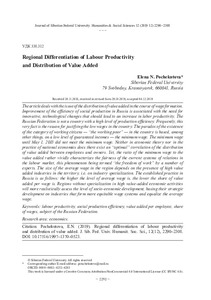Показать сокращенную информацию
Regional Differentiation of Labour Productivity and Distribution of Value Added
| Автор | Pochekutova, Elena N. | en |
| Автор | Почекутова, Е.Н. | ru_RU |
| Дата внесения | 2019-12-30T05:23:03Z | |
| Дата, когда ресурс стал доступен | 2019-12-30T05:23:03Z | |
| Дата публикации | 2019-12 | |
| URI (для ссылок/цитирований) | https://elib.sfu-kras.ru/handle/2311/128434 | |
| Аннотация | The article deals with the issue of the distribution of value added in the course of wage formation. Improvement of the efficiency of social production in Russia is associated with the need for innovative, technological changes that should lead to an increase in labor productivity. The Russian Federation is not a country with a high level of production efficiency. Frequently, this very fact is the reason for justifying the low wages in the country. The paradox of the existence of the category of working citizens — “the working poor” — in the country is based, among other things, on a low level of guaranteed incomes — the minimum wage. The minimum wage until May 1, 2018 did not meet the minimum wage. Neither in economic theory nor in the practice of national economies does there exist an “optimal” correlation of the distribution of value added between employees and owners. Yet, the ratio of the minimum wage to the value added rather vividly characterizes the fairness of the current systems of relations in the labour market, this phenomenon being termed “the freedom of work” by a number of experts. The size of the average wage in the region depends on the presence of high value added industries in the territory, i.e. on industry specialization. The established practice in Russia is as follows: the higher the level of average wage is, the lower the share of value added per wage is. Regions without specialization in high value-added economic activities will more realistically assess the level of socio-economic development, basing their strategic development on industries that form more equitable wage systems and equalize the average wage | en |
| Аннотация | В статье рассмотрена проблема распределения добавленной стоимости при формировании оплаты труда. Повышение эффективности общественного производства в России связывают с необходимостью инновационных, технологических изменений, которые должны привести к росту производительности труда. Российская Федерация не является страной с высоким уровнем эффективности производства. Зачастую именно этот факт служит доводом для обоснования низкой заработной платы в стране. Парадокс существования в стране категории работающих граждан — «работающих бедных» — основан, в том числе, на низком уровне гарантированных доходов — минимальном размере оплаты труда. Минимальный размер оплаты труда до 1 мая 2018 г. не соответствовал прожиточному минимуму. Размер средней заработной платы в регионе зависит от присутствия на территории отраслей с высокой добавленной стоимостью, т.е. от отраслевой специализации. Сложившая практика в России такова, чем выше уровень средней заработной платы, тем ниже доля добавленной стоимости, приходящейся на оплату труда. Регионы, которые не имеют специализации в видах экономической деятельности с высокой добавленной стоимостью, более реально оценивают уровень социально-экономического развития, основывая свое стратегическое развитие на отраслях, формирующих более справедливые системы оплаты труда и выравнивающих уровень средней заработной платы | ru_RU |
| Язык | en | en |
| Издатель | Сибирский федеральный университет. Siberian Federal University | en |
| Тема | labour productivity | en |
| Тема | social production efficiency | en |
| Тема | value added per employee | en |
| Тема | share of wages | en |
| Тема | subject of the Russian Federation | en |
| Тема | производительность труда | ru_RU |
| Тема | эффективность общественного производства | ru_RU |
| Тема | добавленная стоимость на одного занятого | ru_RU |
| Тема | доля оплаты труда | ru_RU |
| Тема | субъект Российской Федерации | ru_RU |
| Название | Regional Differentiation of Labour Productivity and Distribution of Value Added | en |
| Альтернативное название | Региональная дифференциация производительности труда и распределение добавленной стоимости | ru_RU |
| Тип | Journal Article | en |
| Контакты автора | Pochekutova, Elena N.: Siberian Federal University 79 Svobodny, Krasnoyarsk, 660041, Russia; potschekutova@mail.ru; ORCID: 0000–0002–4252–4203 | en |
| Контакты автора | Почекутова, Е.Н.: Сибирский федеральный университет Россия, 660041, Красноярск, пр. Свободный, 79 | ru_RU |
| Страницы | 2290–2308 | ru_RU |
| DOI | 10.17516/1997–1370–0523 | |
| Журнал | Журнал Сибирского федерального университета. Гуманитарные науки. Journal of Siberian Federal University. Humanities & Social Sciences;2019 12 (12) | en |

